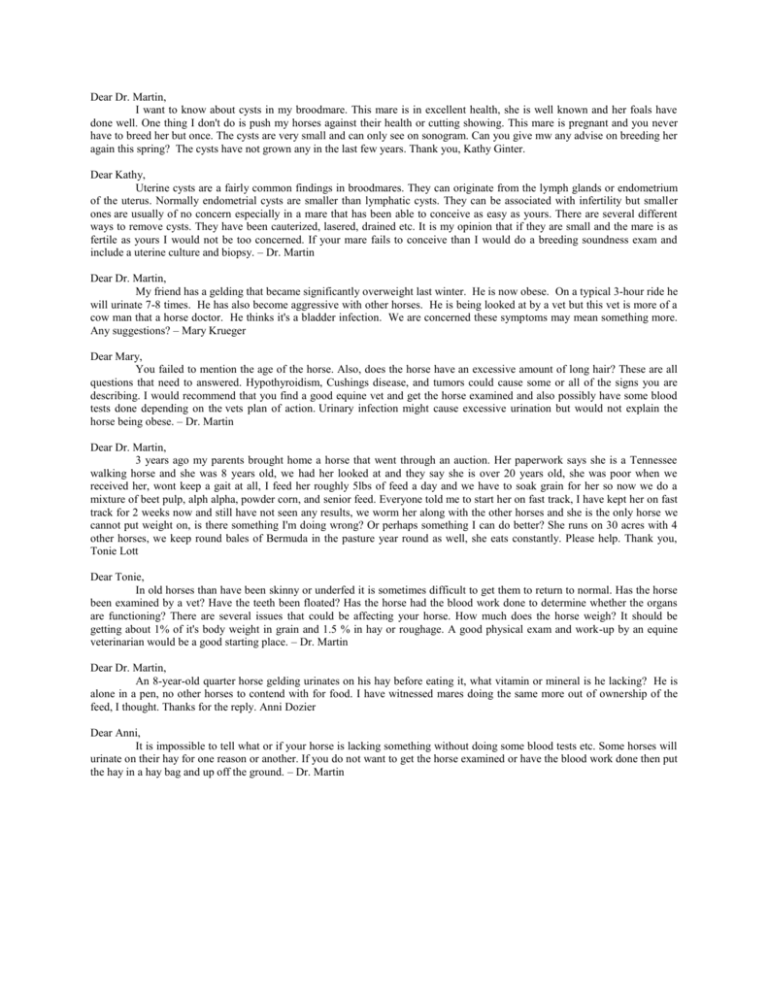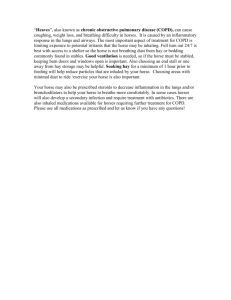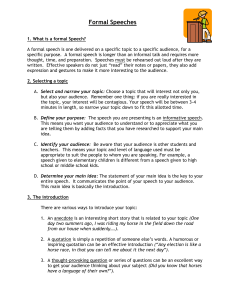Dec06-Vet - The Horse Gazette
advertisement

Dear Dr. Martin, I want to know about cysts in my broodmare. This mare is in excellent health, she is well known and her foals have done well. One thing I don't do is push my horses against their health or cutting showing. This mare is pregnant and you never have to breed her but once. The cysts are very small and can only see on sonogram. Can you give mw any advise on breeding her again this spring? The cysts have not grown any in the last few years. Thank you, Kathy Ginter. Dear Kathy, Uterine cysts are a fairly common findings in broodmares. They can originate from the lymph glands or endometrium of the uterus. Normally endometrial cysts are smaller than lymphatic cysts. They can be associated with infertility but smaller ones are usually of no concern especially in a mare that has been able to conceive as easy as yours. There are several different ways to remove cysts. They have been cauterized, lasered, drained etc. It is my opinion that if they are small and the mare is as fertile as yours I would not be too concerned. If your mare fails to conceive than I would do a breeding soundness exam and include a uterine culture and biopsy. – Dr. Martin Dear Dr. Martin, My friend has a gelding that became significantly overweight last winter. He is now obese. On a typical 3-hour ride he will urinate 7-8 times. He has also become aggressive with other horses. He is being looked at by a vet but this vet is more of a cow man that a horse doctor. He thinks it's a bladder infection. We are concerned these symptoms may mean something more. Any suggestions? – Mary Krueger Dear Mary, You failed to mention the age of the horse. Also, does the horse have an excessive amount of long hair? These are all questions that need to answered. Hypothyroidism, Cushings disease, and tumors could cause some or all of the signs you are describing. I would recommend that you find a good equine vet and get the horse examined and also possibly have some blood tests done depending on the vets plan of action. Urinary infection might cause excessive urination but would not explain the horse being obese. – Dr. Martin Dear Dr. Martin, 3 years ago my parents brought home a horse that went through an auction. Her paperwork says she is a Tennessee walking horse and she was 8 years old, we had her looked at and they say she is over 20 years old, she was poor when we received her, wont keep a gait at all, I feed her roughly 5lbs of feed a day and we have to soak grain for her so now we do a mixture of beet pulp, alph alpha, powder corn, and senior feed. Everyone told me to start her on fast track, I have kept her on fast track for 2 weeks now and still have not seen any results, we worm her along with the other horses and she is the only horse we cannot put weight on, is there something I'm doing wrong? Or perhaps something I can do better? She runs on 30 acres with 4 other horses, we keep round bales of Bermuda in the pasture year round as well, she eats constantly. Please help. Thank you, Tonie Lott Dear Tonie, In old horses than have been skinny or underfed it is sometimes difficult to get them to return to normal. Has the horse been examined by a vet? Have the teeth been floated? Has the horse had the blood work done to determine whether the organs are functioning? There are several issues that could be affecting your horse. How much does the horse weigh? It should be getting about 1% of it's body weight in grain and 1.5 % in hay or roughage. A good physical exam and work-up by an equine veterinarian would be a good starting place. – Dr. Martin Dear Dr. Martin, An 8-year-old quarter horse gelding urinates on his hay before eating it, what vitamin or mineral is he lacking? He is alone in a pen, no other horses to contend with for food. I have witnessed mares doing the same more out of ownership of the feed, I thought. Thanks for the reply. Anni Dozier Dear Anni, It is impossible to tell what or if your horse is lacking something without doing some blood tests etc. Some horses will urinate on their hay for one reason or another. If you do not want to get the horse examined or have the blood work done then put the hay in a hay bag and up off the ground. – Dr. Martin








